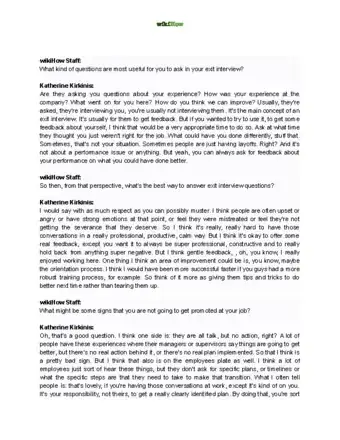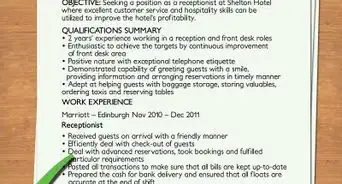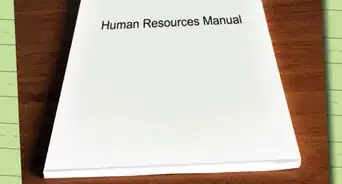This article was co-authored by Katherine Kirkinis, Ed.M., MA. Katherine Kirkinis is a Career Coach and Psychotherapist who has served as a career expert for Forbes, Medium, Best Life, and Working Mother Magazine, and as a diversity and inclusion expert for ATTN and Quartz. She specializes in working with issues of career, identity, and indecision. She has doctoral-level training in career counseling and career assessment and has worked with hundreds of clients to make career decisions through career assessments. She is pursuing a doctoral degree at The University of Albany, SUNY where her work focuses on diversity and inclusion, racism in the workplace, and racial identity. She is a published author and has been featured in academic journals as well as popular media outlets. Her research has been presented at 10+ national APA conferences since 2013.
wikiHow marks an article as reader-approved once it receives enough positive feedback. This article received 13 testimonials and 90% of readers who voted found it helpful, earning it our reader-approved status.
This article has been viewed 291,039 times.
Human resource managers act as liaisons between employees and corporate leadership. Within an organization like a company or a charity, HR managers are responsible for maintaining positive relationships between the employer and employees and ensuring that workers are happy and satisfied. The path to becoming a human resources manager is long but can be rewarding.
Steps
Getting the Proper Education
-
1Learn about the career path. Before you start on the path to becoming a human resources manager, spend some time learning about the career path. Becoming a human resources manager can be a high-paying, rewarding career path.
- Human resource managers have a great deal of responsibility. They plan, direct, and coordinate administrative functions of an organization and are responsible for hiring new staff, helping executives with strategic planning, and helping foster positive communication between an organization's management and its employees.[1]
- One positive thing about being a human resource manager is that the job is always in demand. Nearly every type of business or organization needs a human resources manager. The average annual range is, nearly $100,000 per year.[2]
- The demand for human resources managers is expected to grow over the years. It may be easier to find employment as time goes on.[3]
-
2Take relevant courses in high school. If you want to become a human resources manager, take relevant courses in high school. You should also stock up on extracurricular activities that are relevant to your career.
- Take classes in business, marketing, and economics. You may also want to take classes in psychology as you'll need to be able to work with people. Some background in psychology can give you input into how people think.
- Seek out leadership positions in high school. This can look good on a college application and help you start gaining experience that can help you land internships in colleges. Be the captain of a sport's team. Get a position on student council. Volunteer at local non-profits and charities, seeking positions of power.
- Study hard in school and maintain a high GPA. Strive to do well on any standardized tests, such as the ACTs and the SATS, as high scores combined with good grades can help you get into a good college or university.
Advertisement -
3Earn a bachelor's degree. You need at least a bachelor's degree to become a human resources manager. Work towards a bachelor's degree in a relevant subject if you want to become a human resources manager.
- If your school has human resources management as a major, this is probably the best option. Other relevant fields of study include business and finance. A minor in something like psychology can also be helpful as you'll be working with people as a career.[4]
- Try to stock up on relevant courses for electives. Take advanced business courses, management courses, and marketing courses not required for your degree path. This could potentially impress an employee.[5]
-
4Pursue internships or summer work during college. It is vital to gain internship and work experience during college if you want to be a human resources manager. Employers will look to your resume to see if you have relevant skills as you seek out entry level positions. Make the most out of college by gaining experience during your education.
- Any job that requires working with people is great for a human resources management position. Look for sales position, marketing jobs, and other part time work that requires a lot of face-to-face interactions with customers and clients during college.[6]
- As you reach your junior and senior year, look for internships. You can talk to a career counselor at your school about where to look for internships. You can also let professors and fellow students know you're on the lookout for internship experience. They might pass the information on to you.[7]
Gaining Experience
-
1Write a resume. A solid resume is an invaluable marketing tool. Before graduation, compile a solid resume that you can use to market yourself as you seek out entry level work.
- Formatting in a resume should be consistent. If you use bullet points to explain your experience for one job, use bullet points to talk about the next job. Keep font sizes and choices consistent. Go for easily legible fonts over flowery, cursive types.[8]
- Make sure you include your e-mail, address, full name, and a link to your personal website if you have one.[9]
- Word your experience is an impressive terms as possible. If you worked as a sales associate at Macy's during college, for example, don't say, "Helped customers pick out clothes." Instead, say something like, "Advised customers on a wide array of stylistic options provided by the Macy's corporation, providing polite and informative feedback on product choices." You can find a list of resume buzzwords online that can help you phrase your resume.
- A fun resume design can help set your resume apart. You can look up lists of creative resume designs online for inspiration. If you're applying for a job in a more creative firm, a fun resume can really bolster your chances of landing an interview.
- Take advantage of the resources at your college while you're still a student. Have a career adviser look over your resume and give you feedback. Go to any resume workshops provided by your college.
- Make sure to include a cover letter as well—this clarifies the job that you're applying to and makes sense of your career history for the employer.[10]
-
2Seek an entry level position. Once you've graduated, use your resume to find entry level experience. Usually a year of experience is required for a human resources manager position so be on the lookout for jobs in business, manager, and human resources. You'll have to work your way up to become an HR manager.
- Go to any job fairs offered by your college. Be sure to hand out your resume to any recruiters. Networking is often key to finding a job.[11]
- Talk to past colleagues. Tell your old supervisors from work and internship experience you're looking for a job. Talk to old professors. Let fellow graduates who've found work know you're on the job hunt.
- Job boards, such as Indeed.com and Monster, also post job listings on occasion. Consider applying to some work through these places as well. You may be less likely to hear back, however, as many people apply for jobs through these means.
-
3Practice solid interview skills. If you're called in for an interview, practice good interview skills. Being respectful, professional, and impressive during an interview can help land you a job.
- Always dress up for interviews. For women, wear a conservative blouse and dress pants or a professional dress or women's suit. For men, a suit and tie is best. Make sure your shoes are also business professional. It might be a good idea to conceal any tattoos or piercings.[12]
- Use solid non-verbal communication. Make eye contact with the interviewer. Smile and nod to show you are listening. Stand up straight to convey confidence. Offer a firm handshake at the beginning and end of the interview.[13]
- Research the company before going in for an interview.[14] You want to show that you're invested and interested in the potential job. Spend some time browsing the company website learning about the company's mission, ethics, and history.[15]
- Always ask questions at the end of the interview.[16] Do not simply ask logistic questions, such as the pay or when you can expect to hear back. Instead, ask broad, open-ended questions like, "What is your company's culture like?" and "What do you like about working here?"[17]
-
4Consider a master's degree. After working in the field for a year or so, consider a master's degree. While a master's is not required for all human resource manager positions, it can certainly help set you apart from the competition. For some positions, the additional training that comes with a master's degree may be required.
- For certain specific fields of human resource management, such as labor or industrial relations, a master's may be required. There are a variety of fields in which you can get your master's to advance in the field of human resources management.[18]
- You may be able to simply get a master's in human resources management. However, a master's in business administration can also help. Talk to human resource managers you know have master's degrees and ask them for advice and recommendations. This can help you make an informed decision.[19]
Continuing Your Career
-
1Find work in a human resources department. Once you've earned your master's or worked in the field for a while, start looking for human resource positions. Working in human resources can allow you to work you way up to a management position.
- Use connections from your college, internship, or graduate program or search general job listings for open positions.
- If you're currently employed somewhere, you might be able to apply for jobs within your company in the human resources department. Most company's are more likely to hire an employee who already works for them rather than hiring an outsider.
-
2Work in the field for a few years. Certification is generally the next step in the human resource management career field. However, certification exams generally require one year of professional HR experience. More experience can increase your likelihood of being approved to take the exam. It might be a good idea to work in the field of HR for a few years before pursuing certification.
-
3Pursue certification. Once you've had a few years of experience, pursue certification. Certification can set you apart from the competition during the hiring process.
- You can apply to take the exam through a variety of certification programs. The best program for you depends on your state and career goals. Fees and the application process vary but most certification programs require a master's degree and at least a year of professional experience.
- You can find a certification handbook for the exam you choose online. This handbook will provide an extensive overview of the exam process and procedures. It will also provide a study guide you can use to take the certification exam.
-
4Pass the certification exam. Once you schedule your exam state, take the exam at the required time and place. Exam length varies by state and certification program. In some programs, you'll get your scores right away. In others, you'll have to wait a few weeks for your scores to come in the mail. Once you pass your exam, you'll usually receive some kind of certificate.
-
5Continue seeking higher paying work. After certification, you can start pursuing higher paid management positions. With a certification, master's, and a few years of experience you should have an edge over the competition. As with previous job searches, seek work through networking with former employees and peers. You can also seek out employment on job boards.
Community Q&A
-
QuestionWhat if I don't have good communication skills.?
 Kimberly HorvathCommunity AnswerIn order to be successful in HR, your communication skills need to be great! You will need to communicate well in person, over the phone, and in writing. If you don't have good communication skills, consider gaining those skills by taking classes and reading books on communication.
Kimberly HorvathCommunity AnswerIn order to be successful in HR, your communication skills need to be great! You will need to communicate well in person, over the phone, and in writing. If you don't have good communication skills, consider gaining those skills by taking classes and reading books on communication. -
QuestionHow do I get into human resource management?
 Community AnswerAfter you earn your degree, do some certification course relating to HR, then try and gain some experience at entry level. You can also work to get your masters degree.
Community AnswerAfter you earn your degree, do some certification course relating to HR, then try and gain some experience at entry level. You can also work to get your masters degree. -
QuestionHow many years of work does it usually take to become a manager.
 Community AnswerIf you're starting from the beginning, then 5-7 years, in general.
Community AnswerIf you're starting from the beginning, then 5-7 years, in general.
Expert Interview

Thanks for reading our article! If you'd like to learn more about becoming a human resources manager, check out our in-depth interview with Katherine Kirkinis, Ed.M., MA.
References
- ↑ http://www.bls.gov/ooh/management/human-resources-managers.htm
- ↑ http://www.bls.gov/ooh/management/human-resources-managers.htm
- ↑ http://www.bls.gov/ooh/management/human-resources-managers.htm
- ↑ http://learn.org/articles/Human_Resources_Management_5_Steps_to_Becoming_a_Human_Resources_Manager.html
- ↑ http://learn.org/articles/Human_Resources_Management_5_Steps_to_Becoming_a_Human_Resources_Manager.html
- ↑ http://learn.org/articles/Human_Resources_Management_5_Steps_to_Becoming_a_Human_Resources_Manager.html
- ↑ http://learn.org/articles/Human_Resources_Management_5_Steps_to_Becoming_a_Human_Resources_Manager.html
- ↑ https://owl.english.purdue.edu/owl/resource/719/1/
- ↑ https://owl.english.purdue.edu/owl/resource/719/1/
- ↑ Katherine Kirkinis, Ed.M., MA. Career Coach & Psychotherapist. Expert Interview. 14 October 2020.
- ↑ http://learn.org/articles/Human_Resources_Management_5_Steps_to_Becoming_a_Human_Resources_Manager.html
- ↑ http://career-advice.monster.com/job-interview/interview-preparation/boost-your-interview-iq/article.aspx
- ↑ http://career-advice.monster.com/job-interview/interview-preparation/boost-your-interview-iq/article.aspx
- ↑ Michael McCutcheon, PhD. Career Coach & Psychologist. Expert Interview. 14 October 2020.
- ↑ http://career-advice.monster.com/job-interview/interview-preparation/boost-your-interview-iq/article.aspx
- ↑ Michael McCutcheon, PhD. Career Coach & Psychologist. Expert Interview. 14 October 2020.
- ↑ http://career-advice.monster.com/job-interview/interview-preparation/boost-your-interview-iq/article.aspx
- ↑ http://learn.org/articles/Human_Resources_Management_5_Steps_to_Becoming_a_Human_Resources_Manager.html
- ↑ http://learn.org/articles/Human_Resources_Management_5_Steps_to_Becoming_a_Human_Resources_Manager.html
About This Article
If you're interested in becoming a human resources manager, start early and take classes in high school that are specific to your goals, such as business, marketing, economics, and psychology. You'll also want to seek out leadership positions, such as the president of student council or the captain of a sports team, to give you experience in managing people. Finally, earn your bachelor's degree in business or finance and consider a minor in psychology since you'll need to work well with various personality types. For tips on getting a master’s degree or certification, keep reading!












































































